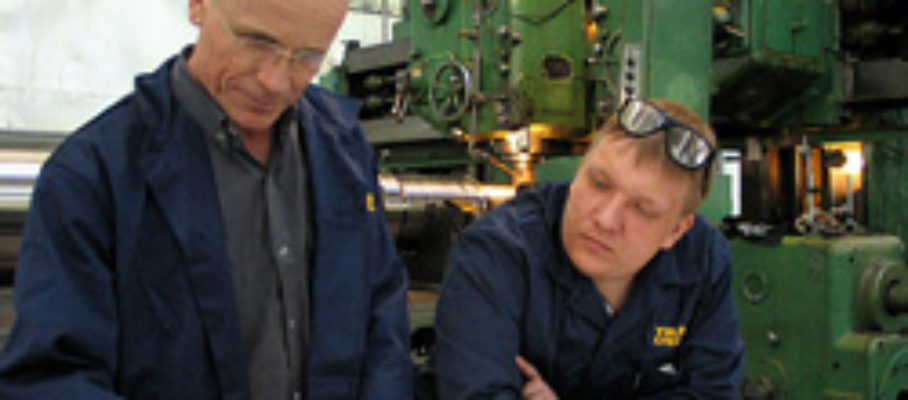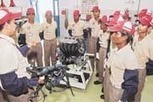Jan 20 2012
From Russia: Ural Diesel Motors goes Lean
January 9, 2012 | News Lean forum
Source: Machine Engineering Portal
The top managers of the Urals Diesel Engine Plant (UDMZ, a division of Cinara-Transport Machines) received training in the principles of doing business based on the concept of Lean Manufacturing. Specialists from Orgprom reviewed manufacturing processes, interviewed managers and line personnel, and demonstrated in practice how to eliminate non-productive losses. As an example, they analyzed the process for manufacturing a diesel generator from raw materials warehouse to finished products, and identified opportunities to increase productivity and improve product quality without any investment.
According to UDMZ Deputy General Director for Production Ivan Kölsch, the use of the tools and methods of Lean Manufacturing gives a new perspective on the organization of management, production and logistics processes in the enterprise, and lets managers see additional resources to improve effectiveness, meet consumer demand, and engage each employee in the improvement process. In the first quarter of 2012, the company plans to analyze the manufacturing processes of two more products, and compile a list of organizational and technical changes to implement Lean Manufacturing throughout the factory.




Jan 24 2012
Lean versus the Toyota Production System
Is there a difference between Lean and the Toyota Production System (TPS)? This is a recurring question. The short answer is yes, but, when you look deeper, it is an issue of packaging as well as of substance.
If you are working in a car company, you cannot openly say that you are using Toyota‘s production system. How could you borrow such things from a competitor, especially if you have been in the business 50 years longer? It is embarrassing to employees, and a weak marketing message. So, regardless of how much you actually use from TPS, you must call it your own “Production Way” or “Operating System,” or…
A generic name like Lean clearly has many practical advantages over TPS. This being said, the minute Lean branched out from Toyota, divergence was to be expected. Major tools of Lean, like Value-Stream Mapping or Kaizen Events are either minor or non-existent in TPS, while the jidoka column of TPS is largely ignored or misunderstood in Lean. See Art Smalley’s presentation at the 2006 Shingo Prize conference, or Working with Machines. The combination of Lean with Six Sigma is also popular in the US, even though Toyota evaluated and passed on Six Sigma.
The umbilical cord, however, was never broken, and the promoters of Lean still use Toyota as a reference. Clearly, nobody would be interested in Lean if it weren’t backed up by the Toyota story, and this raises the question of how far Lean can drift from TPS and still retain this vital link.
The following two comments in the Leadership and Lean The Top 5% discussion group on LinkedIn, highlight the issues. This is what Allison Corabatir has to say, based on her experience at Magna:
Who would argue with that? Anna Johnson, on the other hand, describes a very different experience:
When Anna says that Lean “emphasizes cost cutting, headcount reduction,” she describes a 180-degrees turn away from TPS. This version of “Lean” isn’t just a watering down but a betrayal. It is taking the approach with which financial managers have hurt US Manufacturing from the 50s to the 70s, and calling it Lean to mislead audiences into believing that it is Toyota’s approach.
Anybody can slap the Lean label on anything, and it is only a matter of time until this free-for-all makes it worthless. It results in implementations that are best described as L.A.M.E. (Lean As Mistakenly Excecuted) or L.I.N.O (Lean In Name Only). To avoid this, you have to start from the underlying principles of TPS and deploy them in an context-appropriate fashion, but it is easier said than done, because Toyota didn’t do a great job of articulating these principles and we have to reverse-engineer them from TPS.
Lists of principles can be long, abstract, vague and toothless like the UN’s Universal Declaration of Human Rights, or short, specific, and actionable, like the US Bill of Rights. In The Toyota Way, Jeffrey Liker spells out specific and actionable principles, but there are 14 of them, which is too many to remember. The Lean Enterprise Institute has 5 principles, easier to remember but focused exclusively on the flow of materials. They say nothing, for example about human resources. You could claim to follow these principles while practicing yo-yo staffing, hiring massively in boom times and laying off in recessions.
The HBR article on Lean Knowledge Work summarizes Lean principles as follows:
There are good reasons to use the word Lean rather than TPS to designate what we do. Lean evolves in many different directions as it inspires people in different industries to pursue improvement in ways that work in their context, and it is healthy that they should do so. But there will always be bandwagon jumpers just using the label to sell products or services.
Share this:
Like this:
By Michel Baudin • Asenta selection, Management 21 • Tags: Lean, Lean manufacturing, Toyota, Toyota Production System, TPS